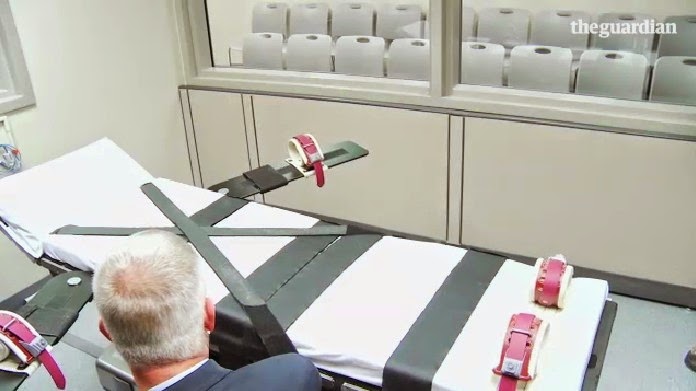 |
| Oklahoma brand new execution chamber |
OKLAHOMA CITY, OKLA. — Oklahoma's attorney general is seeking to delay three upcoming executions, including two set for next month, saying that the state needs more time to obtain drugs and train staff on new lethal injection protocols put in place after an execution went awry in April.
Attorney General Scott Pruitt filed a notice late Friday seeking to delay the executions of Richard Eugene Glossip, John Marion Grant and Charles Warner until 2015. Warner had been originally scheduled to die on April 29 — the same night that inmate Clayton Lockett writhed and moaned on the gurney, prompting the state to put all executions on hold until a review was conducted.
Warner's new execution date is Nov. 13, but Pruitt said in the court filing that Oklahoma does not have the necessary drugs or commitments from medical personnel to carry out the execution.
"The state does not want to rush implementation of this new training program, especially so soon after revision of the execution protocol," Pruitt wrote. "The additional requested time for all three executions will allow (the Oklahoma Department of Corrections) sufficient time in which to obtain the necessary drugs and medical personnel and to fully and thoroughly train each member of the new execution team."
An attorney representing the death row inmates had no immediate comment Monday on the filing.
A review from the Oklahoma Department of Public Safety blamed an improperly placed intravenous line for the troubles in Lockett's execution.
The botched execution of Clayton Lockett helped reignite debate over the death penalty in the US. As The Christian Science Monitor reported:
The death penalty no longer has quite the unassailable support it once had in Oklahoma, especially not in the state’s courts, as a national battle over the legality of lethal injection has washed into the state’s courtrooms.
In recent months, a pitched battle has arisen between opponents and supporters of capital punishment over whether states have the right to use lethal injection drugs from sources they decline to name. States have been reaching out to such pharmacies over the past few months, after the European manufacturer of the most common drug used in the procedure cut off supplies to death houses.
Death penalty opponents have leveraged the issue of states using secret suppliers' drugs – which opponents say could be of poor quality, bringing unconstitutional suffering to the condemned – to get bigger questions about the legality and ethics of capital punishment back into courtrooms.
Source: The Christian Science Monitor, AP, Sean Murphy, October 13, 2014










